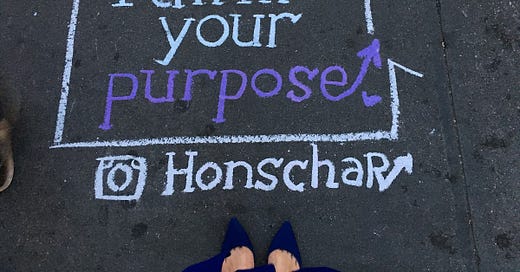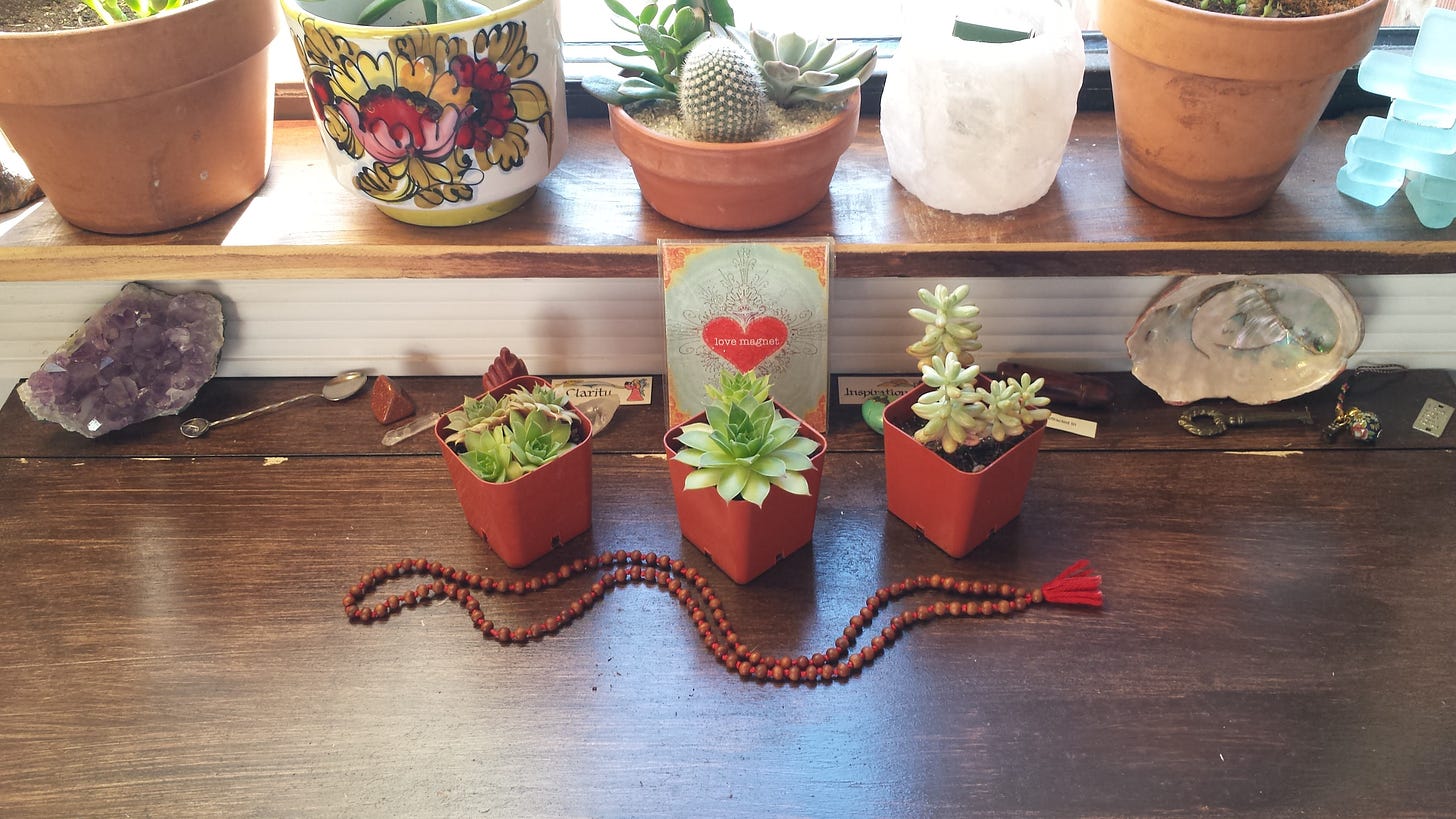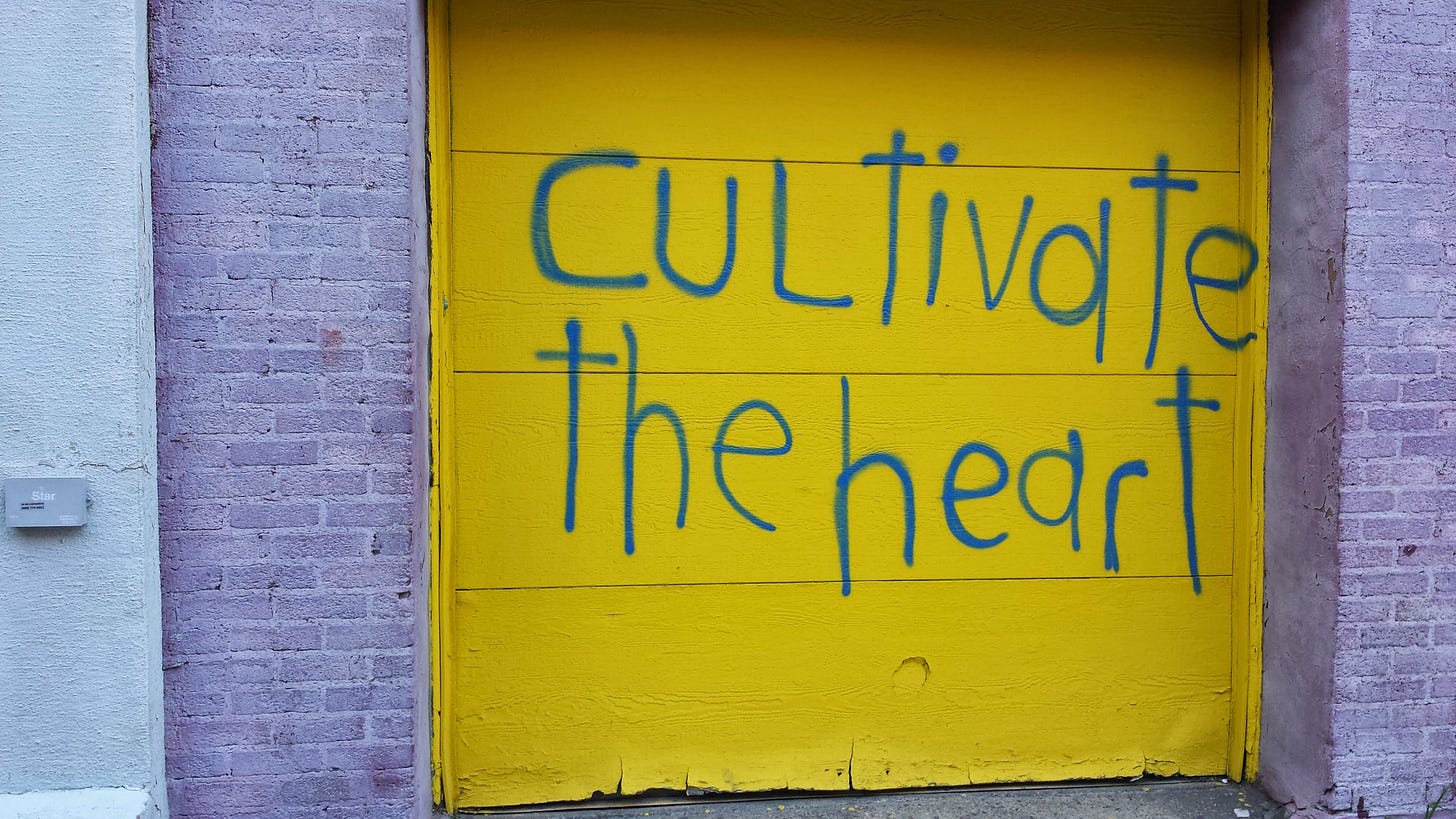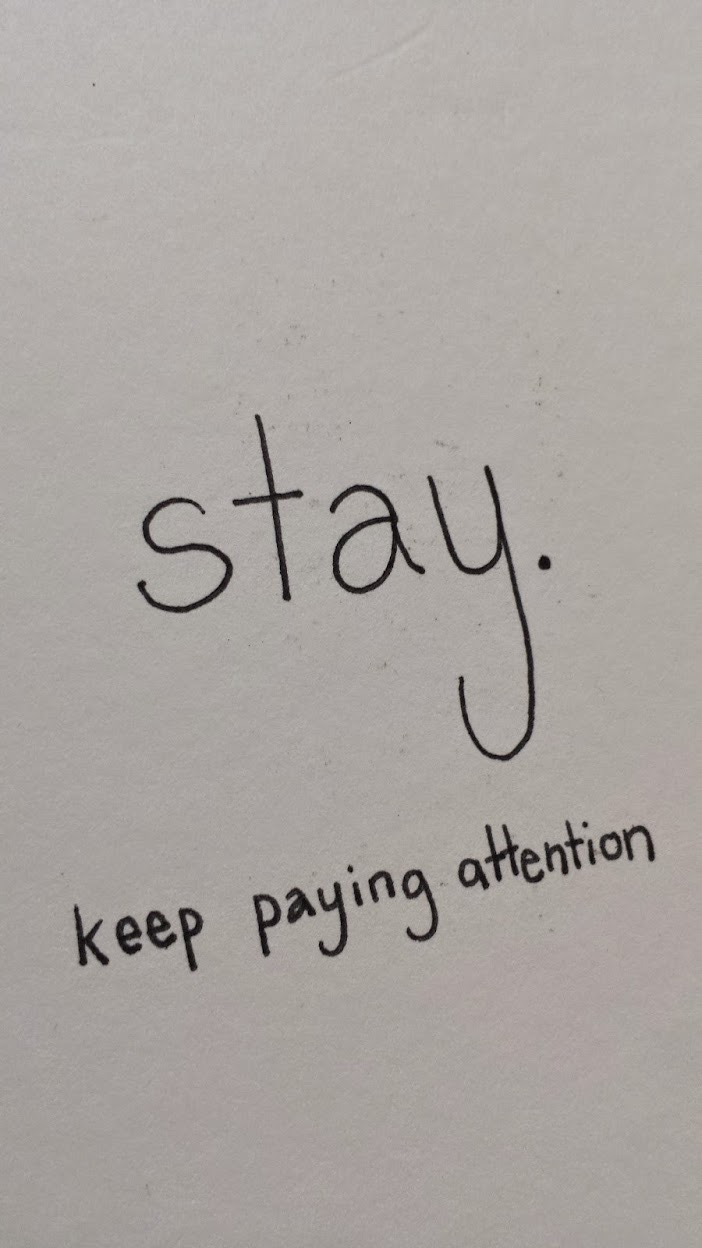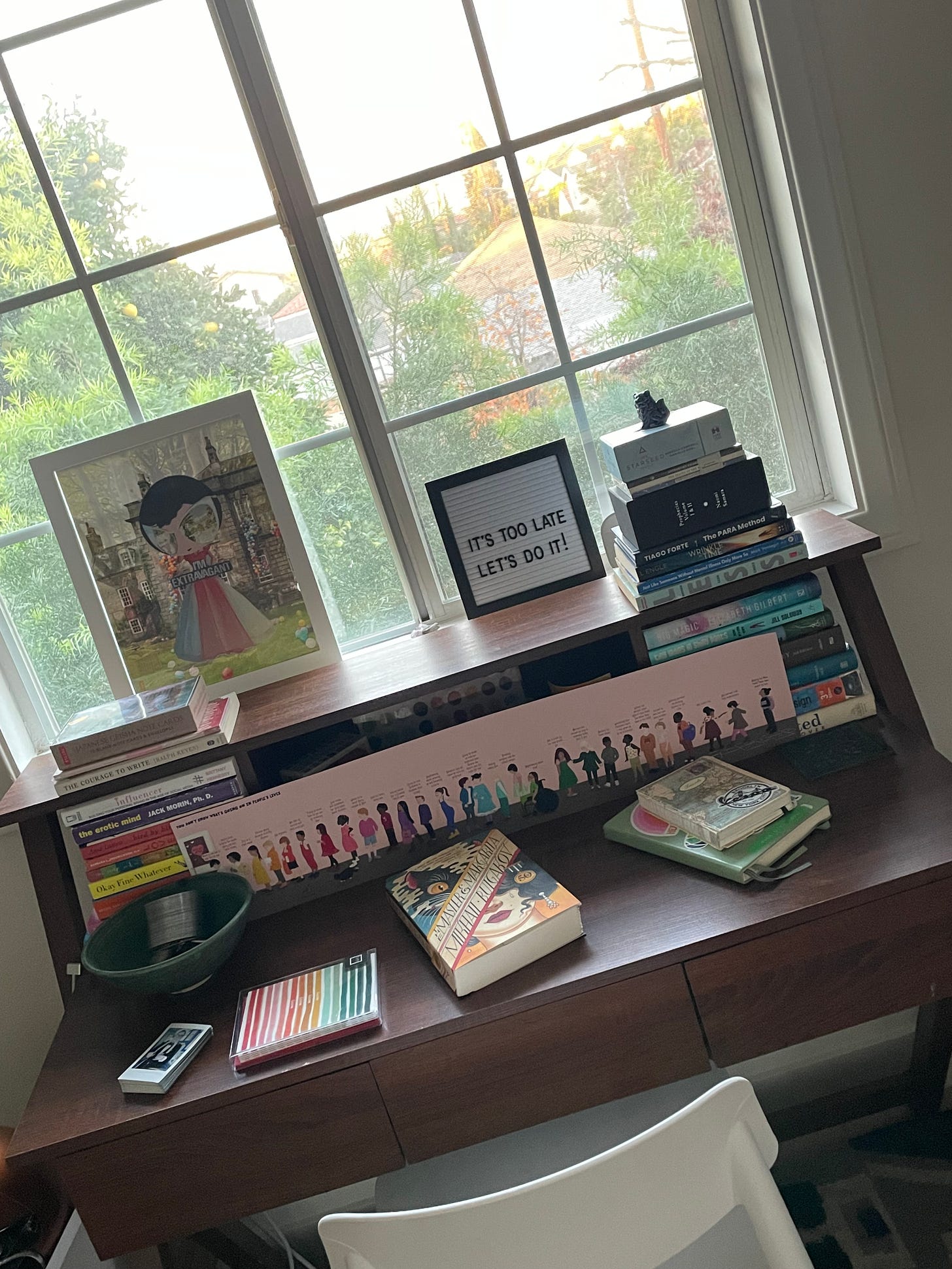Rather aggressive, sidewalk chalk! Don’t you think? / New York, NY // August 2016
I stopped making resolutions circa 2013.
I’m not sure why that year was particularly disillusioning, but. There you have it! That’s when I threw my hands up and said: Nope! Resolutions are promises to yourself that you break! I’m not doing that anymore.
But when I stopped making resolutions, I missed the cultural pageantry. That fresh-notebook energy. The collective New Year! New Me! The siren call of self-improvement and growth.
I love shiny things. I could feel the thrum of New Year’s resolutions on the glittery air. I still wanted to harness their power (all that hope! let’s bottle it!) and begin my arbitrarily-marked year with reflection, revelation, recalibration… [Say that three times fast.]
reflection revelation recalibration
reflection revelation recalibration
reflection revelation recalibration
I just wanted something I couldn’t break.
I considered adopting a mantra. You can’t break a mantra. (Well, maybe you can. I don’t know you. I don’t know your powers. But.) A mantra is a reminder. A nudge, not a promise. Notice I even said ‘adopting.’ Like a child. Not like a toy.
A mantra is a word or phrase that you say (or sing, or silently repeat in your head) over and over. Mantra is Sanskrit for “mind-tool.” It’s either a tool for your mind or it makes a tool out of your mind, or both.
Insert Yoda voice: Mind you use, or use you your mind will.
Malas are like yogi rosaries. They’ve got 108 beads. They’re made of smooth sandalwood or nubbly rudraksha seeds, traditionally. You can find them around the necks of monks, New Age tech bros, and sober movie stars.
This mala used to live on my desk in 2014. All of those plants are dead, but the mala, remains. Somewhere.
The beads do the counting for you. One bead, one mantra, one brush of the thumb. (Clockwise? Let’s go with clockwise. A clockwise brush of the thumb.)
At the end — or the beginning — of the mala is a tassel. Often crimson, or saffron yellow. And an additional bead—the head bead. Once you get to the head bead, you stop, or start again. (Supposedly, in some traditions you skip the head bead entirely, and in others that is considered “stepping over the head of your teacher.” Which could be kind of kinky? At any rate.)
If a mantra is a mind-tool then a mala is a mind-tool’s tool.
I used to know a lot of modern yogis. Just about every one of them had a mala draped on an altar, around their neck, or wrapped around their wrist like a bracelet. For proof. A sort of hanky code for spiritual tourists.
Every time I see one I want to touch it. I mean, I want to touch lots of things. I’m a very touchy person. But just like hair, or butts, or cell phones, you’re not supposed to touch someone else’s mala without permission.
Denise Payne, an old yoga teacher of mine, once gave me the mala right off her wrist. As I closed my fingers around the smooth beads, still warm from her skin, she said, “A lot of work went into that.” I’m not sure what she meant by it. I could have asked her, but I never did. A lot of hopes? A lot of requests? A lot of well-wishes? A lot of concentration? I looked at the mala and imagined her sitting with her eyes closed, hour after hour, reminding herself of something, something that felt like work.
This seemed like a nice, good way to acquire a mala — as a present. It seemed righter than buying one from “World Gifts” or a spiritual bookstore called Namaste. It also felt like a responsibility. Now that I had a mala, someone else’s mala, that had been infused with all this (assumingly good) juju, now, surely, I would pray … right?
Nope.
Once. Maybe twice.
I don’t pray that way, it seems.
I’m not sure I pray at all. Much to my father’s chagrin.
Perhaps I thought a mala should be a gift because people told me a mantra should be one. (Shoulds and shouldn’ts and supposed-to’s annoy me more and more with every passing year.) Yoga teachers told me my mantra should be bestowed upon me by an enlightened master.
Ah, an enlightened master. Lemme just grab one real quick.
It sounded so enticing, the notion that some visionary teacher — some stranger — could instantly see my past, present, and future, and choose precisely the mantra I require for my growth as a person. I imagined the relief of trusting someone enough to allow them to choose what I focus my life force on, and to believe that they are right about it.
If I’ve ever felt that, I don’t recall.
Still, I sought a mantra. Over a decade ago, I went to see a Renowned Spiritual Teacher. I waited in a line. A line of hundreds. Hundreds on a quest to be blessed; many of us soliciting the perfect mantra.
Western yogis who wear Lululemon seem to like their mantras in Sanskrit. Now I don’t know anyone who speaks Sanskrit, but despite (or perhaps because of this), Sanskrit mantras have a certain caché. Ancient texts, they say. Origins of yoga, they say. So pure, they say. More sacred, they think?
Though we weren’t supposed to share our mantra, we couldn’t help ourselves. We were like giddy elementary school kids. We really didn’t understand why we shouldn’t tell each other. Why not share our mantra with everyone? Won’t we be more accountable that way? More likely to practice?
This was how we learned that some of us got the exact same mantra.
Perhaps we did indeed need the same medicine. But something didn’t feel right. Something didn’t feel true. I’m a New Yorker by birth and by heart. The bullshit detector is strong with me. Renowned Spiritual Master gave me a mantra that didn't resonate. It didn’t stir anything within me. I didn’t recognize it like an old friend or a fresh aha. It seemed… pretty generic. This is the lesson I must devote my life to learning?
So, just like Denise’s mala, I didn’t use it.
I don’t even remember it.
I’m not sure I believe that any language has inherent magic. I will never deny that words can do magic. But if they have magic on us, it is because we agree that they mean something. We believe.
A Kundalini yoga teacher I used to know told me about this time at a kirtan (a spiritual sing-along) when an acolyte asked her name.
“Leah,” she said.
“Yeah, but what’s your spiritual name?”
“Leah,” she said.
I wondered about the difference between a mantra and a prayer1. I stopped wondering when I realized I wasn’t gonna do either. Without resolution, or mantra, or mala, or prayer, how would I ritualize my new year?
If resolutions work for you, that’s great. If you have a mantra you are taking into 2024, that’s very well. If you have another way to pray for what’s coming to be better than what’s past, then you have it. For those of us that don’t: I much prefer the idea that if we pay enough attention, we can be our own enlightened masters.
Many shoes fit. But one pair will be the right pair (for now).
I have a friend who changed his name from Nick to Feather Hawk, because Feather Hawk was the right pair. Leah, however, felt like a Leah.
And I felt like a motto.
Garage door with a motto / Brooklyn, NY // June 2014
To me, a motto feels potent, like a mantra. But a motto is in my language. It is a personal call to action. It’s both North Star and compass. In January 2013, I chose: Show Up, and Keep Moving Forward. It scratched my resolution itch, and it wasn’t a promise that sagged by March.
Am I showing up? I asked myself. Or, what would I do right now if I were showing up?
That year, I wrote Show Up, and Keep Moving Forward on the inside cover of every little notebook I carried. I saw it nearly every day, sometimes multiple times a day. I didn’t always live up to my motto. I spent plenty of days in pajamas, binge-watching HBO on my post-it-sized laptop and eating popcorn for dinner. But that didn’t mean it was broken. It meant I wasn’t following my compass that day. Or, on that day, I didn’t need to. Because sometimes, the right thing is to drift. I did show up more that year, literally and figuratively. I left the house for things other than work. I went to more auditions. I danced more Tango. I showed up, but at the close of that year, I didn’t really feel like I was propelling myself forward.
So in January 2014, I chose something with more momentum: Pick Up the Ball, and Run With It. I got a new job, completed the second draft of a play I co-wrote with a friend (which featured a pair of guardian crones, Gertrude & Estelle, who are still some of my favorite characters), and began a book.
In 2015, my motto was Stay.
I liked the shorter motto better.
I wanted to stay. I wanted to dance with the person I was dancing with, teach the people I was teaching, fuck the person I was fucking.
Stay. Keep paying attention.
When I was teaching AcroYoga back in the day, I had a friend and yoga student named Laura, who was living a life of bright-eyed presence in Carrboro, North Carolina. I met her touring the U.S., either in 2008 or 2011, I’m not sure which. She told me that she was so comfortable with simply being that she had push herself to make her life more about doing. I find this both hard to fathom and exceedingly admirable. Laura was surprised when I told her how hard it is for me to pay attention.
"So when you're doing all those acrobatic moves, you're thinking about other things?"
"Yes," I said.
She laughed and laughed.
I was exaggerating. (It was wonderful to hear Laura laugh.) What I meant was, my attention bounces, rapidly, back and forth between what I'm doing and … something I'm not doing. Of course, I was much more likely to be thinking about other things when I was doing a trick I’d nailed (or when I was being observed, no matter how much practice I’d had). My brain took advantage of my muscle memory. It went Ah! No need to focus! We now process other conundrums! — like whether that handsome circus artist is flirting with us. IS HE?!
My ex used to say that the sustained ability to focus is one definition of intelligence. (He probably still says this. I just don’t talk to him anymore.) He said, as a lawyer, a case will reveal itself differently after ten hours of paying attention than after four.
My old acting coach, Alan Savage, whose teaching style inspired me to give up acting for a decade, also believed that greatness is directly correlated to the ability to focus. (Yes. One of my formative yoga instructors was called “pain,” and one of my formative acting teachers “savage.” Coincidence?)
In yoga philosophy, the path is eightfold. The 8 limbs of yoga are basically a protocol for ascendence. They are (more or less poorly translated): the restraints, the codes of conduct, the physical postures, breathing techniques, sense withdrawal, concentration, merging, and oneness. The sixth, concentration or focus, is the gateway to the ‘higher’ ones. They get more esoteric as you go along. The message is clear: To become enlightened, you must first be able to concentrate.
My goals were — and are — much less lofty. I’d be delighted to be able to pay attention when I choose to. (Yes yes, meditate, Lila, etc. etc. No advice please.)
Paying attention leads to absorption. Athletes call this being "in the zone," artists call it being "in the flow," and I want it. I want it as much as possible. I catch a tailwind sometimes. Writing. Reading. Performing. Fucking. The couple of times I climbed rocks on purpose. Occasionally I look up from the page and see that an hour — or three — has gone by, and I wouldn’t have guessed how long. I am usually so time-bound. (If chronically late. Sorry, friends.) The timelessness of flow is ecstasy to me.
When I danced Tango, sometimes I paid attention, and sometimes I didn’t. When I wasn’t, and I wanted to be, I had a ritual. I added my motto to it. I deliberately felt into the floor beneath me … the arms wrapped around me … the music wafting over me … and gently reminded myself to stay.
My former roommate's motto was, Take it Easy.
The Dead Poets Society’s was, Seize the Day!
Kenneth’s used to be, Just let it Happen.
Some other possibilities:
Fuck it!
Take the doughnuts.2
What do I want?
Roots & Wings.3
It’s worth it.
You’ll know the right motto when you speak it — it will kind of glow a little.
If you aren’t keen on any particular motto, I suggest you work with this one:
Be Kind.
In the past 6 months, I’ve rekindled my dreams of acting and moved to Los Angeles for the winter. The Inner Critics love to say things like, “Hardly anybody makes it,” and “You don’t have the credits,” and “It’s too late, honey.”
So I decided that Samia and I are starting a club. The Too Late Club.
Our club motto is:
It’s too late. LET’S DO IT!
I’m going to make patches or bomber jackets or pins or something. You want? I want.
THE TOO LATE CLUB
It’s not too late. You can sit with us.
Maybe this New Year, you’ll join me. Borrow my motto or choose your own.
Once you’ve chosen one, write it down somewhere. Everywhere! Post it where you’ll see it every day. On the bathroom mirror! On the car dashboard! On the back of your phone!
Tell your beloveds.
Reply to this missive and share it with me.
And then, let it be your mind-tool, your compass.
Let it point you true.
I once read that Maya Angelou’s favorite prayer is “Thank you, thank you, thank you.” I think that one I can do, maybe.
A la Amanda Palmer’s book The Art of Asking, which I’m re-reading as I gear up to fundraise for my intimacy card game. It means: work through your hang-ups about receiving and graciously accept what is offered to you.
I am told that this is what German parents try to provide for their children: roots and wings. This is what I’ve been trying to provide for myself for the past 17 years.
Keep reading with a 7-day free trial
Subscribe to horizontal with lila to keep reading this post and get 7 days of free access to the full post archives.

